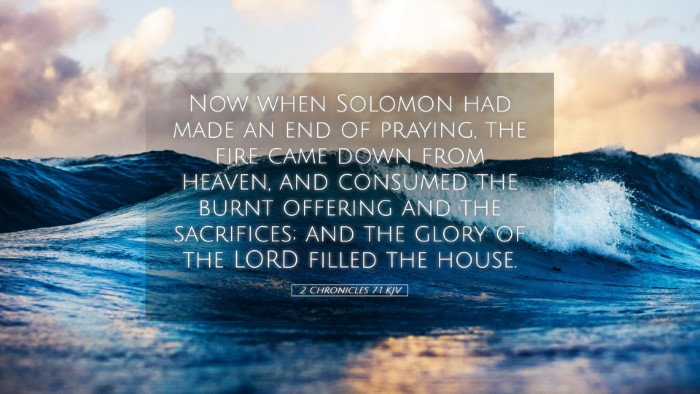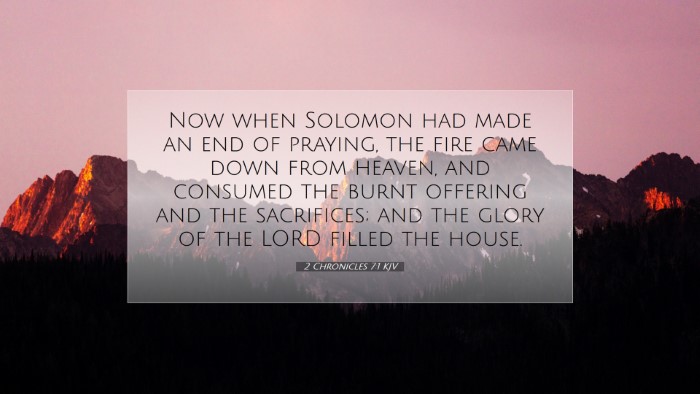Commentary on 2 Chronicles 7:1
Verse: "Now when Solomon had made an end of praying, the fire came down from heaven and consumed the burnt offering and the sacrifices; and the glory of the Lord filled the house."
Introduction
This verse marks a pivotal moment in the history of Israel's worship and in the life of Solomon's temple. The prayer of Solomon, offered at the dedication of the temple, not only expresses his reliance on God but also sets the stage for God’s response. This response is dramatic, as it signifies divine approval and presence.
Theological Significance
Divine Approval: The fire coming down from heaven signifies God's acceptance of Solomon's prayer and the devotion of the people. This act symbolizes God's covenant relationship with His people. It echoes the fire that consumed offerings in earlier instances, like those made by Gideon and Elijah.
Presence of God: The glory of the Lord filling the temple signifies God’s presence among His people. In the Old Testament, God's glory often manifested in physical forms, illustrating His holiness and majesty.
Commentary Insights
Matthew Henry’s Commentary
Matthew Henry emphasizes the significance of prayer in this moment. He notes that Solomon’s dedication of the temple included earnest prayer that acknowledged God's sovereignty, which invites divine engagement. Henry comments on the nature of fire as a purifying force that not only consumes but also indicates God's presence. He articulates that the consuming fire and the filling of the temple with glory were both affirmations of God’s acceptance and a warning against any form of false worship.
Albert Barnes’ Notes
Albert Barnes elaborates on the symbolic elements of this event. He highlights how the fire represents both judgment and purification, noting that it is God acting not only to consume but also to signify His presence. Barnes explains that the glory of the Lord filling the temple symbolizes a life that is to be lived in the light of God's presence, inferring that the temple itself is a microcosm of God's dwelling among His people. Furthermore, he maintains that such manifestations set a precedent for worship, indicating that God desires to be among His people in powerful ways.
Adam Clarke’s Commentary
Adam Clarke offers a historical perspective on the significance of the fire descending from heaven. He draws parallels to previous instances of divine fire in the Scriptures, showing their consistent representation of God’s approval and holiness. Clarke posits that this incident at the temple was not only a moment of divine interaction but also a moment of national significance for Israel. The glory filling the temple indicates a new era, reinforcing that the temple is now the dwelling place of God. Clarke reminds readers that such events highlight the necessity of purity and holiness in worship.
Applications for Today
This verse holds practical applications for pastors, theologians, and students by underscoring the significance of prayer and the need for genuine worship. The following points summarize these applications:
- The Importance of Prayer: Solomon’s prayer precedes God’s response, illustrating that heartfelt intercession invites God's presence and action.
- Holiness in Worship: The fire's descent serves as a reminder that God desires pure worship. Leaders must call for holiness in both corporate and personal worship settings.
- God’s Presence: Just as God's glory filled the temple, the New Testament believers are reminded that they are the temple of the Holy Spirit, encouraging a life marked by awareness of God’s presence.
- Covenantal Relationship: Understanding God's response to Solomon reinforces the faithfulness of God to His covenant, encouraging believers to trust in His promises.
Conclusion
2 Chronicles 7:1 is a powerful reminder of God's active participation in the life of His people. The intersection of Solomon’s prayer and God's divine response illustrates the profound relationship between humanity and the divine. For scholars and theologians, this verse is a cornerstone for understanding worship, sacrifice, and the nature of God’s presence among His people. Reflecting on this moment encourages a deeper exploration of how prayer, holiness, and community worship invite the living God into our lives today.


